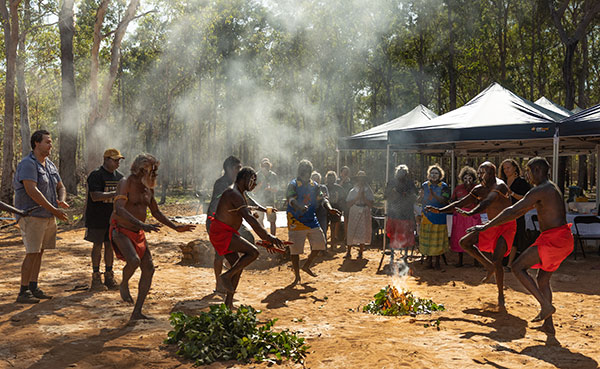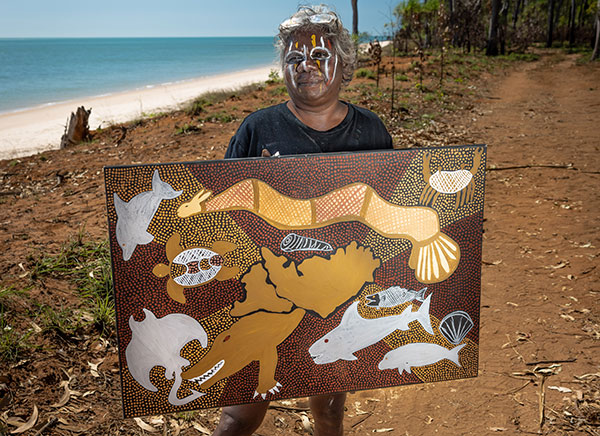Last week for the first time in Australian history, the Federal Court heard evidence on-Country in the Tiwi Islands, surrounded by stringy bark trees and a gentle breeze.
Represented by EDO lawyers, Tiwi Senior Lawman, Dennis Tipakalippa, launched action against Santos and the Federal Offshore Regulator in June arguing that there had been a failure to consult about drilling plans to develop the Barossa gas field, just 150kms north of the islands.
Santos began drilling in the Timor Sea last month despite opposition from Tiwi people and Mr Tipakalippa’s legal challenge still being before the Federal Court. Drilling beyond the gas reservoir increases the risk of a hydrocarbon spill.
“Drilling into the seabed is like drilling into our bodies. I’m relieved that Santos will drop drilling before it gets to the gas and will not start any new well – that is a big worry for us, so it’s very important to get that promise,” said Dennis Tipakalippa.
“This week, we have had our voices heard. We will fight to protect our Sea Country, from the beginning to the end.”
Last week, on Monday 22 August, EDO travelled to Pitjamirra on Melville Island, a remote beach along the coastline closest to the drilling, where a makeshift court was set up under gazebos.

Tiwi Elders welcomed the Court with a smoking ceremony. Throughout the day, Tiwi witnesses danced and sang their evidence. The knowledges and expertise of First Nations witnesses is integral to our client’s arguments against the approval of drilling in the Barossa gas field.
The on-Country hearing allowed Tiwi people to communicate their stories to the Federal Court on their terms, in a culturally appropriate way and on Country where they are connected to their ancestors.
Paulina Jedda Puruntatameri, a Munupi Traditional Owner who gave evidence, told the court:
“If you from Pitjamirra, your songline connects you from here to the deep water… That’s where the turtles are. The Munupi clan have connection to the sea. They have Turtle dance, they sing about the Turtle,” Puruntatameri said.
“There’s a lot of iminga that are in the water… These are sacred sites that are not to be disturbed.”

Cultural and spiritual evidence is an essential part of this case. The decision to hear evidence on the Tiwi Islands centres First Nations knowledges and expertise. It means a great deal to the Munupi community, who have been fighting long and hard for their voices to be heard.
Tiwi Islands mayor and senior Munupi Traditional Owner, Pirrawayingi, told the court that Santos should have directly consulted the Munupi Traditional Owners.
“If something goes wrong, if there’s a spill… that is what is our people thinking about, the damage that will perhaps last for a long time, perhaps forever in a spiritual way to the people,” Pirrawayingi said.
“We are holders of anything that’s on the sea, in the sea, under it and all its existence… It is part of us… when someone drills on the ground, on land, or on the sea and it’s close to your – the proximity of your land and your boundary in a whitefella way that has been created, then when that drilling starts in our way, spiritually, they are drilling a hole inside our body.”
Santos wants to develop one of Australia’s most polluting offshore gas projects, which would lock in gas extraction for the next 20 years and fuel dangerous climate change. Drilling threatens turtles, sharks, dugongs, fish and other marine species which are an essential source of food for the Tiwi community.
Marine animals are also totems for Tiwi people, and the loss of a totem animal represents a significant cultural and spiritual loss. This was one of the big concerns that Tiwi people brought forward in their evidence.
After the on-Country hearing, the court moved Darwin to hear the remainder of the proceedings.
This case is about people getting a say about what is most precious to them. The court has heard compelling evidence last week about the cultural and spiritual significance of this Sea Country and what is at stake for Mr Tipakalippa and the Munupi Clan if the drilling plans proceed.





